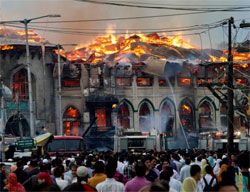
Srinagar, July 1: As normal life resumed in Srinagar and other parts of the Valley Saturday, Kashmir survived yet another tragedy - this time without any blood being spilt on the roads.
The destruction of the second holiest Muslim shrine of the Valley in a mysterious blaze on Monday threw Kashmiris into a state of shock and mourning, reminding one of a similar tragedy in 1995 when the shrine of the Valley's patron saint, Sheikh Noor-ud-Din Wali, was destroyed in a blaze in central Kashmir's Charar-e-Sharief town.
In December 1997, another highly revered shrine, Khanqah-e-Faiz Panah of Mir Ali Syed Hamdani, was destroyed in a blaze in south Kashmir's Tral town.
The reverence of Sheikh Abdul Qadir Jeelani, known as Peer Dastgeer by the Muslims and Kahnoow by the local Hindus, extends back centuries. The relics preserved inside the over-300-year-old include a hair of the saint's beard, a Quranic manuscript by Iman Ali Murtaza, son-in-law of the Prophet and another manuscript by Caliph Abu Bakr.
The relics are believed to have been brought here by an Afghan governor 337 years ago.
The strike in mourning against the destruction of the shrine was spontaneous and total. As the news about the destruction of the shrine spread, some youths started pelting stones at the security forces, who clamped curfew-like restrictions in the trouble prone areas of the old city.
It must be said to the credit of the people that despite the shock and mourning over the destruction of the Muslim hrine, the Hindu pilgrimage to the Amarnath Cave shrine continued without a hiccup. While roads remained deserted and markets appeared haunted during the last five days, nobody stopped or interfered with the hundreds of vehicles carrying pilgrims to the Amarnath Cave shrine in south and north Kashmir areas.
If certain elements were out to exploit the situation for political reasons, this time the state administration also acted with firmness and fortitude.
The state government did not go into hiding. Chief Minister Omar Abdullah visited the shrine site, cutting short his London visit.
State governor N.N. Vohra, union minister Ghulam Nabi Azad, state Congress chief Saif-ud-Din Soz, former union minister Karan Singh and Leader of Opposition in the assembly Mehooba Mufti visited the site in sharp contrast to 2010 summer unrest when all the mainstream leaders had gone into hiding.
While the decision of the state administration placing the separatist leaders under house arrest disallowing their requests to visit the shrine has been criticized, the state chief minister, Omar Abdullah, is patting his administration for handling the situation well.
"And if you want to see examples of people who would rather have seen blood spilt on the streets take a look at my timeline", Abdullah posted on his Twitter site.?
He described his decision to clamp curfew-like restrictions as timely.
"So while I have no hesitation in apologizing to people inconvenienced by the restrictions we did what we had to do to keep the peace", he commented.
As educational institutions, markets, traffic, post offices, government offices and other businesses started normally in Srinagar city and elsewhere in the Valley today, Kashmiris have silently made a loud statement - the shrine will be restored to its original glory, but blood of youth won't be spilled on roads to settle political scores.





Comments
Add new comment